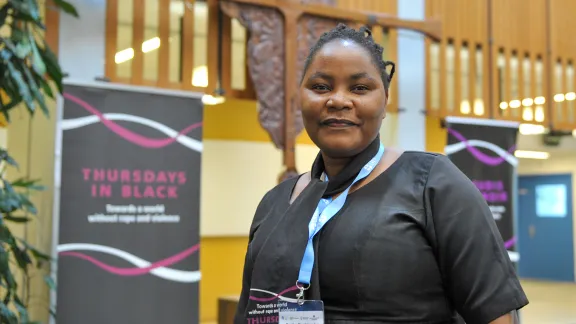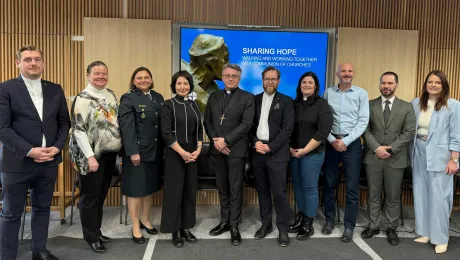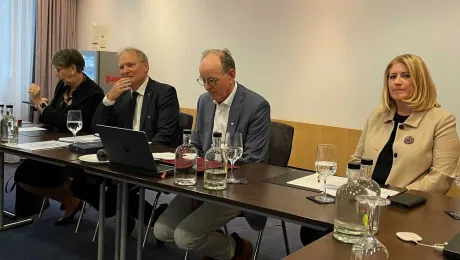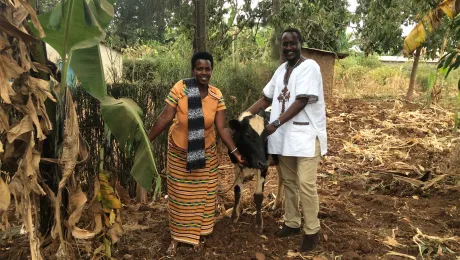An ecumenical human rights advocacy training in Geneva helps those working for gender justice in countries like Malawi to learn new skills and discover a network of like-minded people

Rev. Bertha Godfrey Munkhondya. Photo: LWF/M. Renaux
Rev. Bertha Godfrey Munkhondya learns skills and finds hope at a human rights advocacy training in Geneva
(LWI) - Bertha Godfrey Munkhondya’s childhood was quite different to many of the girls in her village of Chisenga in the northern Chitipa district of Malawi. The eldest of four girls and two boys, she was encouraged to study and pursue her dreams, in a country where only 13 percent of girls complete secondary school and over 40 percent are married before the age of 18. “I’m thankful to God that my parents did not raise us with different gender roles,” she says, recalling how her brothers were taught how to cook and to help with other household chores.
After finishing school, Munkhondya went to study theology at Tumaini University Makumira in Tanzania. In September 2021, she became the first – and so far, the only – woman to be ordained in the Evangelical Lutheran Church in Malawi. Based in the capital, Lilongwe, she heads her own congregation and serves as deputy pastor at the Lutheran cathedral. She is also the church’s gender justice officer and spent the past week in Geneva attending the annual women’s human rights advocacy training.
Organized by The Lutheran World Federation (LWF) and the World Council of Churches, in partnership with Finn Church Aid and Norwegian Church Aid, the program brought together almost 30 women's rights activists from different parts of the globe. Participants learned about gender justice advocacy at the United Nations and explored ways of connecting to national, regional and international platforms that can enhance and support their own work.
Meeting with CEDAW commissioners
The 17 to 20 October training included a visit to the United Nations to attend a session of the Committee on the Elimination of Discrimination Against Women (CEDAW) which was reviewing progress towards women’s rights in Malawi. Participants also had the opportunity to meet over an informal lunch with some of the experts who sit on that committee and who examine how far each country is complying with the commitments it signs up to when it ratifies the CEDAW treaty.
As an advocate for women and girls’ rights, Munkhondya uses bible study classes and home visits to help combat traditional practices and patriarchal mindsets that persist in her country. “Girls are very vulnerable, especially in the rural areas, as most parents prefer to send boys to school and girls are raised to be dependent on their fathers, their brothers or their husbands,” she says.
“Some women sell vegetables or have a small business, but their husbands often threaten them with divorce unless they stop working,” she continues. “Biblical texts are also used to teach women that they should not speak in church or question anything that their husbands say. Many of the women cannot read the Bible for themselves and so they believe everything the pastor tells them,” she adds.
Hélène Ralivao scholarship holder
Munkhondya has spent the past year studying the impact of biblical teaching on gender-based violence in Malawi. She received a scholarship from LWF’s Hélène Ralivao Fund, set up in 2021 in memory of a pioneering theologian from Madagascar and her commitment to women’s rights across the African continent. Munkhondya has also been threatened by people who oppose her work of empowering women and supporting them to become financially independent.
“A big problem is when a husband dies and his relatives demand the return of their land, even if the woman has helped to pay for it herself,” she explains. Although Malawi has a National Land Policy which recognizes a woman’s right to own land, traditional practices are widespread and women are often forced to undergo so-called widow-cleansing ceremonies, before being sent back to their families of origin.
One thing I am taking home with me is that we should never lose hope, but we must keep advocating until we achieve our goals.
Rev. Bertha Godfrey Munkhondya from the Evangelical Lutheran Church in Malawi
“The church tries to support some of these women and pay the school fees if they have children to take care of,” Munkhondya says. “We also do a lot of sensitization and awareness raising to help women understand their rights. I work with our local congregations and tell people that they can contact their pastor or me if they need our support. We still have a long way to go but we have had some success stories in helping women to live independent lives.”
After taking part in the advocacy training, Munkhondya is returning to Malawi with new ideas and resources, as well as a network of friends with whom she can share her successes and concerns. Meeting government officials from her country at the UN underlined the importance of raising these concerns to a global level where pressure can help to bring about change. “One thing I am taking home with me is that we should never lose hope, but we must keep advocating until we achieve our goals,” Rev. Munkhondya concludes.


